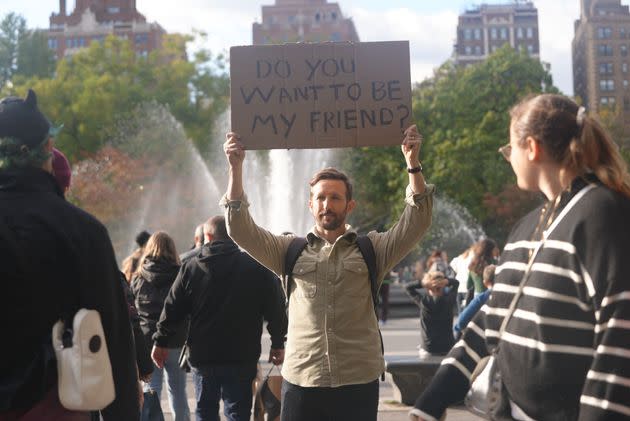Loneliness Led Me To Asking 1000 People To Be My Friend, This Is How It Went

“Friendship neglect is something that creeps up on you”, said Lee Thompson, co-founder and CMO of solo travel company Flash Pack.
“It’s rarely intentional, like many others, my 20s were very sociable and my friendships formed the foundations of life at that time. Things started to change as I entered my thirties, my life goals became increasingly career-related and my priorities shifted to accommodate these.”
He explained that while starting his company with his wife Radha Vyas, he had let everything else slide, including the friendships that once formed his life.
He said: “The importance of regularly checking in with friends - old and new - has no bounds. I felt a real disconnect from my friendships and developed a fear that I had left it too long, leaving me with a sense of anxiety.”
While building a business was a big part of this neglect, Thompson said the difficulty men sometimes have expressing their love for each other doesn’t help, saying: “Men tend to shy away from vulnerability, with many preferring to keep their male friendships on a surface level.
“I’ve noticed that lots of my mates have a tendency to gloss things over and only really open up if someone is there to probe them and ask them how they’re really feeling. This applies to openness with affection as well - it just doesn’t come naturally for a lot of people.”
So, he asked over 1000 people to be his friend
“My partner and I are moving to the US later this year - over 60% of our business is now Stateside - and we wanted to try the ‘Will you be my friend?’ experiment in New York to see if I could make friends, but to demonstrate how difficult it is to do so.”
For this experiment, Thompson took to the streets of New York with a sign simply saying “Will You Be My Friend?”, in a move that he described as, “nerve wracking, terrifying and fun at all the same time.”
He explained: “People really thought I was unwell, going so far to call me ‘crazy’ when I would approach them.
“I tried my hand at stand up comedy, and even handed out a ‘Friendship CV’ with some testimonials from my friend Jonathan and my wife about what it’s like to know me. What I didn’t expect was the sheer volume of people who resonated with this message of feeling lonely in New York, being open to and wanting to make friends as an adult.”
He revealed that he received 1500 messages after the video was shared, with people sharing their own struggles, inviting him to Christmas dinners, tennis matches, or offering to take him out for a coffee.
He said: “I really loved how much the ‘Will you be my friend?’ experiment resonated so much with men - a majority of my messages were from men in their 30s and 40s - which I thought was so important because that demographic is struggling with loneliness the most.
“In a Flash Pack commissioned survey, two thirds (60%) of men said they wished they could be more open and vulnerable with their friends.”
Loneliness really is a huge issue for men. The Jo Cox Commission on Loneliness estimates that eight million men (of all ages) in the UK feel lonely at least once a week.
This experiment also helped Thompson and his wife to flesh out the ethos of the business they were starting. He said: “At Flash Pack, we are obsessed with facilitating meaningful friendships and group dynamics. We will go out of our way to ensure that people are picking the right trips for them to have the best experience possible.”
Thanks to the experiment and everything he’s learned, Thompson has helped other people to make new friends, too.
He explained: “Over 80% of Flashpackers stay in touch after a trip has ended. People end up forming lifelong friendships from one or two weeks together.
“And all because they’ve been proactive and also created an environment together where it feels safe to open up and share their stories.”
Finally, he said for anybody struggling to make friends as an adult: “Friendship can happen, and it’s closer than you think.”

